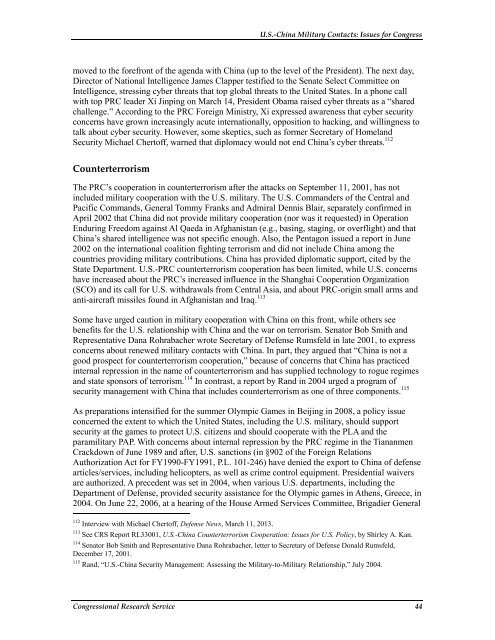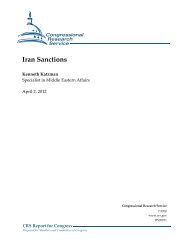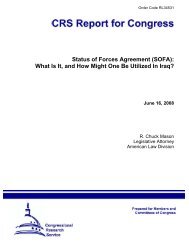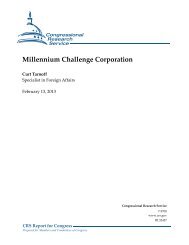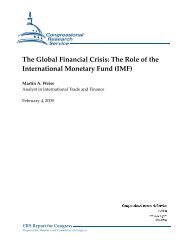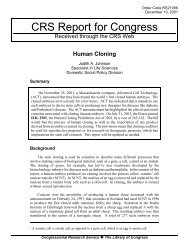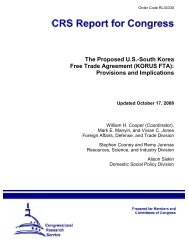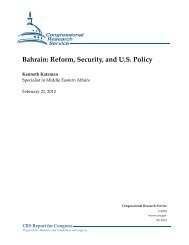U.S.-China Military Contacts: Issues for Congress - Foreign Press ...
U.S.-China Military Contacts: Issues for Congress - Foreign Press ...
U.S.-China Military Contacts: Issues for Congress - Foreign Press ...
Create successful ePaper yourself
Turn your PDF publications into a flip-book with our unique Google optimized e-Paper software.
U.S.-<strong>China</strong> <strong>Military</strong> <strong>Contacts</strong>: <strong>Issues</strong> <strong>for</strong> <strong>Congress</strong><br />
moved to the <strong>for</strong>efront of the agenda with <strong>China</strong> (up to the level of the President). The next day,<br />
Director of National Intelligence James Clapper testified to the Senate Select Committee on<br />
Intelligence, stressing cyber threats that top global threats to the United States. In a phone call<br />
with top PRC leader Xi Jinping on March 14, President Obama raised cyber threats as a “shared<br />
challenge.” According to the PRC <strong>Foreign</strong> Ministry, Xi expressed awareness that cyber security<br />
concerns have grown increasingly acute internationally, opposition to hacking, and willingness to<br />
talk about cyber security. However, some skeptics, such as <strong>for</strong>mer Secretary of Homeland<br />
Security Michael Chertoff, warned that diplomacy would not end <strong>China</strong>’s cyber threats. 112<br />
Counterterrorism<br />
The PRC’s cooperation in counterterrorism after the attacks on September 11, 2001, has not<br />
included military cooperation with the U.S. military. The U.S. Commanders of the Central and<br />
Pacific Commands, General Tommy Franks and Admiral Dennis Blair, separately confirmed in<br />
April 2002 that <strong>China</strong> did not provide military cooperation (nor was it requested) in Operation<br />
Enduring Freedom against Al Qaeda in Afghanistan (e.g., basing, staging, or overflight) and that<br />
<strong>China</strong>’s shared intelligence was not specific enough. Also, the Pentagon issued a report in June<br />
2002 on the international coalition fighting terrorism and did not include <strong>China</strong> among the<br />
countries providing military contributions. <strong>China</strong> has provided diplomatic support, cited by the<br />
State Department. U.S.-PRC counterterrorism cooperation has been limited, while U.S. concerns<br />
have increased about the PRC’s increased influence in the Shanghai Cooperation Organization<br />
(SCO) and its call <strong>for</strong> U.S. withdrawals from Central Asia, and about PRC-origin small arms and<br />
anti-aircraft missiles found in Afghanistan and Iraq. 113<br />
Some have urged caution in military cooperation with <strong>China</strong> on this front, while others see<br />
benefits <strong>for</strong> the U.S. relationship with <strong>China</strong> and the war on terrorism. Senator Bob Smith and<br />
Representative Dana Rohrabacher wrote Secretary of Defense Rumsfeld in late 2001, to express<br />
concerns about renewed military contacts with <strong>China</strong>. In part, they argued that “<strong>China</strong> is not a<br />
good prospect <strong>for</strong> counterterrorism cooperation,” because of concerns that <strong>China</strong> has practiced<br />
internal repression in the name of counterterrorism and has supplied technology to rogue regimes<br />
and state sponsors of terrorism. 114 In contrast, a report by Rand in 2004 urged a program of<br />
security management with <strong>China</strong> that includes counterterrorism as one of three components. 115<br />
As preparations intensified <strong>for</strong> the summer Olympic Games in Beijing in 2008, a policy issue<br />
concerned the extent to which the United States, including the U.S. military, should support<br />
security at the games to protect U.S. citizens and should cooperate with the PLA and the<br />
paramilitary PAP. With concerns about internal repression by the PRC regime in the Tiananmen<br />
Crackdown of June 1989 and after, U.S. sanctions (in §902 of the <strong>Foreign</strong> Relations<br />
Authorization Act <strong>for</strong> FY1990-FY1991, P.L. 101-246) have denied the export to <strong>China</strong> of defense<br />
articles/services, including helicopters, as well as crime control equipment. Presidential waivers<br />
are authorized. A precedent was set in 2004, when various U.S. departments, including the<br />
Department of Defense, provided security assistance <strong>for</strong> the Olympic games in Athens, Greece, in<br />
2004. On June 22, 2006, at a hearing of the House Armed Services Committee, Brigadier General<br />
112 Interview with Michael Chertoff, Defense News, March 11, 2013.<br />
113 See CRS Report RL33001, U.S.-<strong>China</strong> Counterterrorism Cooperation: <strong>Issues</strong> <strong>for</strong> U.S. Policy, by Shirley A. Kan.<br />
114<br />
Senator Bob Smith and Representative Dana Rohrabacher, letter to Secretary of Defense Donald Rumsfeld,<br />
December 17, 2001.<br />
115<br />
Rand, “U.S.-<strong>China</strong> Security Management: Assessing the <strong>Military</strong>-to-<strong>Military</strong> Relationship,” July 2004.<br />
<strong>Congress</strong>ional Research Service 44


